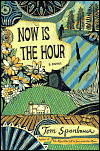 Now Is the Hour
Now Is the Hour
By Tom Spanbauer
Houghton Mifflin, 480 p.
ISBN: 0618584218, $26
Reviewed by Kathleen Dobie
Anyone who writes an autobiographical novel must have a healthy narcissism. Fortunately, in the case of Tom Spanbauer’s Now Is the Hour, that self-love translates into a lyrical, absorbing, and very entertaining coming-of-age tale with a teenage protagonist you can’t help but love yourself.
That narrator, 17-year-old Rigby John Klusener, starts and ends his story on the road as he makes his exodus from the narrow confines of his home near Pocatello, Idaho, for the wider opportunities of San Francisco. In-between is the wonderfully told and richly realized chronicle of a boy consciously and inexorably establishing his own parameters for his relationships with his family, his friends, his lovers, and himself.
The book shares a title with a traditional hymn. Early on, Rigby John says of it, “There’s something about that song. How it’s sad, but at the same time it makes you feel good inside.” Rigby John’s own story is bit like his assessment of the song: There’s a lot to make you sad, but getting to know him makes you feel good.
The rituals, benedictions, confines, freedoms, and the music of the Catholic church are deeply embedded in Rigby John’s life. Church music serves as a bridge between Rigby John and his mother as he sits beside her while she plays hymns, and, occasionally and poignantly, “Chapel of Love.” The church also serves as a platform for rebellion when Rigby John and his sister cruise the local drive-in when their parents think they’re at St. Francis De Sales Club meetings. Rigby John feels the power of “Jesus eyes” during critical moments of his life and finds more than a few opportunities to say, "I loved God so much right then."
Rigby John forms significant friendships during consecutive pivotal summers. Two hired hands his father has him supervise offer Rigby John his first experience of adult friendship along with the opportunity to set standards of his own, in deliberate and direct opposition to those his father espouses. During the hours stolen from De Sales Club meetings, Rigby John embarks on a key friendship with Billie Cody, schoolmate and soul mate. Billie and Rigby John’s relationship is circumscribed by their time and place and yet transcends them — as all important friendships do. They smoke together, they laugh together, they fart and cry in each other’s presence, they neck, they talk, they look at and into each other, they explore the boundaries of their respective worlds and dip their toes into worlds outside their own. And throughout Rigby John’s story runs George Serano, a.k.a. Injun George and Georgy Girl. Rigby John’s first actual meeting with George is filled with drama and trauma and insight, and those themes carry through their working together, being friends — and enemies — to each other, teaching and learning from each other, and hating and loving each other.
Rigby John’s story is universal in feel if not in the particulars, although a great many of the particulars are universally familiar, especially to those of use who were teenagers in the middle decades of the last century: cruising to the popular hang-out spot; trying your utmost to avoid any discussion of sexual issues with your parents — and the humiliating embarrassment of failing; risking your first attempts at physical and emotional intimacy; opening yourself to ideas different from those you’ve been raised to believe are the only valid precepts; battling the fear that you’ll end up being just like your parents. That Rigby John also uncovers the truth of his own sexuality is simply another leg in his journey of self-discovery.
Spanbauer conveys these often pedestrian, yet transformational events, through evocative text that is immediate and witty and as refreshing as an impromptu stop for ice cream on a sweltering summer day. You’re right there in the truck when Rigby John and Billie go on a helpless laughing jag together on their first meeting. You relate completely when Rigby John’s arms turn into helpless blocks of Cheddar during times of emotional confusion. Your stomach knots with the pent-up, unspoken, and barely acknowledged tension that finally erupts into violence against George in the hayfield.
And though the story is told from Rigby John’s point of view, the people in his life are fully fleshed out, independent individuals.
From the first sentence Rigby John’s musings invite you into his world, his life, his soul. And you’re held there securely and comfortably for a long while after you finish the last sentence.
Kathleen Dobie is a writer and activist in Indianapolis, Indiana.